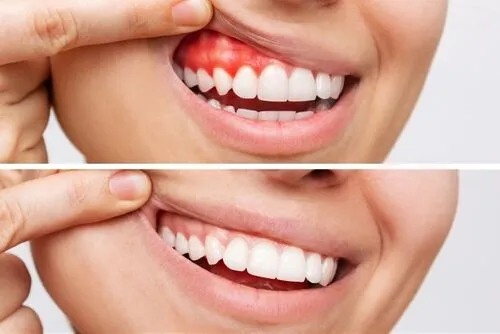Table of Contents
- Introduction: Why are your gums bleeding?
- Top 4 causes of Bleeding Gums?
- When should you see a dentist?
- Top 5 ways to stop your Gum Bleeding
- Conclusion: How to Prevent gum bleeding?
Introduction: Why are your gums bleeding?
Have you noticed blood when you brush your teeth or when you floss? You’re not alone. Bleeding gums are a common concern and while it can seem alarming, it often points to a treatable issue. In fact, according to the World Health Organization, nearly 50% of adults globally experience some form of gum disease. Bleeding gums, in particular can be one of the first signs of a gum infection, but it doesn’t always mean something severe.
In this blog, we’ll explore the main causes of bleeding gums, how to stop them and when you should reach out to a periodontist for help.
If you’re dealing with persistent gum bleeding, don’t wait any longer, Contact Dr. Giuseppe Cicero, world renowned periodontist and gum specialist in Rome to get personalized care.
Top 4 causes of bleeding gums?
Bleeding gums are usually a sign that something’s off with your oral health. Let’s go over some of the most common reasons why your gums may be bleeding.
Gingivitis
One of the most frequent causes of bleeding gums is gingivitis, which is the earliest stage of gum disease. Gingivitis happens when plaque—the sticky film of bacteria—builds up along your gum line and irritates your gums. This inflammation causes your gums to bleed, especially when brushing or flossing.
Periodontitis
If left untreated, gingivitis can progress to periodontitis a more serious gum infection that can result in gum recession , tooth mobility, and even tooth loss. Around 19% of the global population suffers from periodontitis, according to the Global Burden of Disease Study 1 .
Vitamin Deficiencies
Another cause of bleeding gums is a lack of essential vitamins, particularly Vitamin C and Vitamin K. Vitamin C is crucial for healthy gum tissue and a deficiency can lead to bleeding gums and a condition known as scurvy . On the other hand, Vitamin K helps with blood clotting. Without adequate levels of Vitamin K, your gums may bleed more easily.
If you suspect a vitamin deficiency, it’s important to correct it by eating a well-balanced diet or consulting your doctor about supplements.
Hormonal Changes
Hormonal fluctuations—especially during pregnancy, menstruation or menopause—can make your gums more sensitive, leading to bleeding. During pregnancy for example, many women experience swollen and bleeding gums, a condition known as pregnancy gingivitis. According to research, around 30% of pregnant women experience gum issues due to these hormonal changes 2 .
When should you see a dentist?
While mild gum bleeding can often be managed at home with improved oral care, there are times when you should definitely contact a dentist:
- Bleeding that doesn’t stop: If your gums continue to bleed even when you’re not brushing or flossing, it could be a sign of a more serious problem like periodontitis.
- Painful chewing: If chewing becomes painful or difficult due to gum sensitivity, this warrants professional attention.
- Receding gums: If your gums are pulling back from your teeth, exposing more of your teeth or the roots, it may indicate advanced gum disease.
- Localized bleeding: If bleeding occurs around a single tooth, there could be an infection or cavity that needs treatment.
If any of these signs sound familiar, don’t hesitate to reach out to Dr. Giuseppe Cicero. Early intervention can prevent further complications.
Top 5 ways to stop gum bleeding
Now that you understand some of the causes behind bleeding gums, let’s talk about how to stop them and keep your gums healthy. Here are several steps that can help you manage gum bleeding and promote overall gum health:
1. Improve your oral hygiene
One of the most effective ways to stop gum bleeding is to improve your oral hygiene routine. Brushing and flossing regularly can remove plaque and bacteria, which are the main reasons behind gum disease. Here’s what you can do:
- Brush at least twice a day using fluoride toothpaste.
- Floss daily to remove food particles and plaque from between your teeth and under your gum line.
- Use a soft-bristled toothbrush to avoid irritating your gums
- Be gentle while brushing and flossing—vigorous brushing can damage your gums.
Studies show that maintaining proper oral hygiene can significantly reduce gum bleeding and prevent gum disease 4 .
2. Use the right mouthwash
Mouthwash that contains antibacterial agents like chlorhexidine can help fight gum infection and reduce inflammation. Using mouthwash as part of your daily routine can keep your gums clean and promote healing. Make sure to choose a mouthwash that is specifically designed to target gum health.
Research has shown that using mouthwash can improve gum health and help prevent bleeding caused by plaque buildup 2 . Contact your dentist from the best suggestions.
3. Adjust your diet
Your diet plays a significant role in your gum health. A nutrient-rich diet can strengthen your gums and prevent bleeding. Focus on eating:
- Vitamin C-rich foods like oranges and strawberries.
- Leafy greens that are high in Vitamin K, such as spinach and kale.
- Foods high in fiber to help clean your teeth naturally.
A balanced diet not only supports overall health but also helps prevent gum inflammation and bleeding 6 .
4. Quit smoking
If you smoke, it’s important to quit. Smoking damages your gums and weakens your immune system, making it harder for your body to fight infections like gum disease. The World Health Organization links smoking to an increased risk of gum disease and tooth loss 1 . Quitting smoking will help your gums recover and significantly improve your oral health.
5. Get regular dental checkups
Regular visits to your dentist are essential for maintaining healthy gums. A dentist can spot gum issues early and offer treatments like professional cleanings, which remove plaque and tartar that home brushing can’t get rid of. Studies have shown that people who visit their dentist regularly have healthier gums and are less likely to suffer from gum disease 4 .
Conclusion: Maintaining healthy gums
Bleeding gums can be a sign that something’s not right with your oral health, but with the right care, you can manage it. By improving your oral hygiene, adjusting your diet, quitting smoking and seeing your dentist regularly, you can stop gum bleeding and maintain healthy, strong gums for years to come.
If you’re experiencing persistent gum bleeding or need a professional evaluation, don’t wait. Contact Dr. Giuseppe Cicero world renowned periodontist and gum specialist in Rome to schedule a consultation today.
Remember, healthy gums are a foundation for a healthy smile.

